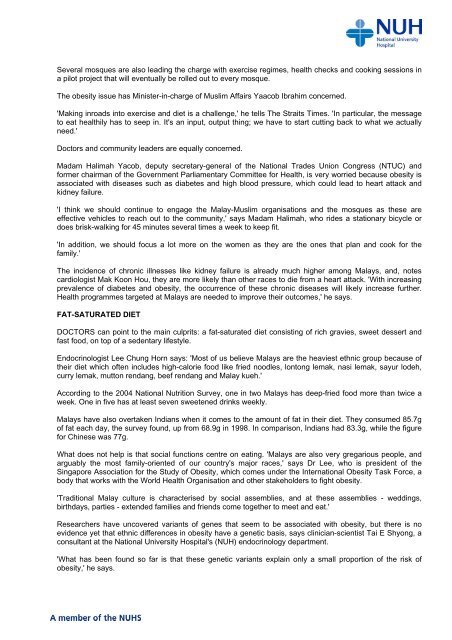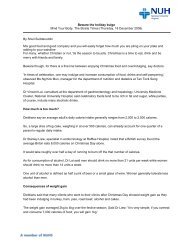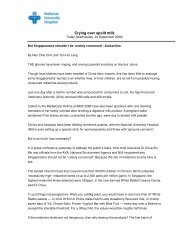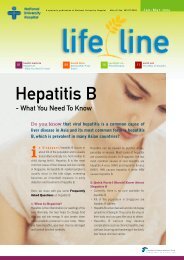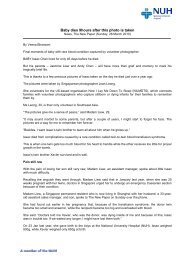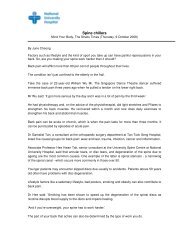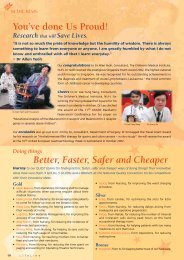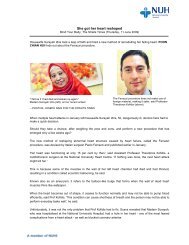Malays & Obesity: Big Trouble - NUH
Malays & Obesity: Big Trouble - NUH
Malays & Obesity: Big Trouble - NUH
Create successful ePaper yourself
Turn your PDF publications into a flip-book with our unique Google optimized e-Paper software.
Several mosques are also leading the charge with exercise regimes, health checks and cooking sessions in<br />
a pilot project that will eventually be rolled out to every mosque.<br />
The obesity issue has Minister-in-charge of Muslim Affairs Yaacob Ibrahim concerned.<br />
'Making inroads into exercise and diet is a challenge,' he tells The Straits Times. 'In particular, the message<br />
to eat healthily has to seep in. It's an input, output thing; we have to start cutting back to what we actually<br />
need.'<br />
Doctors and community leaders are equally concerned.<br />
Madam Halimah Yacob, deputy secretary-general of the National Trades Union Congress (NTUC) and<br />
former chairman of the Government Parliamentary Committee for Health, is very worried because obesity is<br />
associated with diseases such as diabetes and high blood pressure, which could lead to heart attack and<br />
kidney failure.<br />
'I think we should continue to engage the Malay-Muslim organisations and the mosques as these are<br />
effective vehicles to reach out to the community,' says Madam Halimah, who rides a stationary bicycle or<br />
does brisk-walking for 45 minutes several times a week to keep fit.<br />
'In addition, we should focus a lot more on the women as they are the ones that plan and cook for the<br />
family.'<br />
The incidence of chronic illnesses like kidney failure is already much higher among <strong>Malays</strong>, and, notes<br />
cardiologist Mak Koon Hou, they are more likely than other races to die from a heart attack. 'With increasing<br />
prevalence of diabetes and obesity, the occurrence of these chronic diseases will likely increase further.<br />
Health programmes targeted at <strong>Malays</strong> are needed to improve their outcomes,' he says.<br />
FAT-SATURATED DIET<br />
DOCTORS can point to the main culprits: a fat-saturated diet consisting of rich gravies, sweet dessert and<br />
fast food, on top of a sedentary lifestyle.<br />
Endocrinologist Lee Chung Horn says: 'Most of us believe <strong>Malays</strong> are the heaviest ethnic group because of<br />
their diet which often includes high-calorie food like fried noodles, lontong lemak, nasi lemak, sayur lodeh,<br />
curry lemak, mutton rendang, beef rendang and Malay kueh.'<br />
According to the 2004 National Nutrition Survey, one in two <strong>Malays</strong> has deep-fried food more than twice a<br />
week. One in five has at least seven sweetened drinks weekly.<br />
<strong>Malays</strong> have also overtaken Indians when it comes to the amount of fat in their diet. They consumed 85.7g<br />
of fat each day, the survey found, up from 68.9g in 1998. In comparison, Indians had 83.3g, while the figure<br />
for Chinese was 77g.<br />
What does not help is that social functions centre on eating. '<strong>Malays</strong> are also very gregarious people, and<br />
arguably the most family-oriented of our country's major races,' says Dr Lee, who is president of the<br />
Singapore Association for the Study of <strong>Obesity</strong>, which comes under the International <strong>Obesity</strong> Task Force, a<br />
body that works with the World Health Organisation and other stakeholders to fight obesity.<br />
'Traditional Malay culture is characterised by social assemblies, and at these assemblies - weddings,<br />
birthdays, parties - extended families and friends come together to meet and eat.'<br />
Researchers have uncovered variants of genes that seem to be associated with obesity, but there is no<br />
evidence yet that ethnic differences in obesity have a genetic basis, says clinician-scientist Tai E Shyong, a<br />
consultant at the National University Hospital's (<strong>NUH</strong>) endocrinology department.<br />
'What has been found so far is that these genetic variants explain only a small proportion of the risk of<br />
obesity,' he says.


